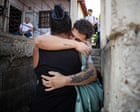
In recent weeks, significant global developments have highlighted pressing human rights and social issues. These matters touch upon the treatment of prisoners, the plight of vulnerable populations, the challenges faced by survivors of coercive control, and efforts to maintain social harmony amid tensions. Each of these stories presents an opportunity to engage thoughtfully with the intricate tapestry of human experiences worldwide, reflecting the diversity and complexity of challenges in our communities.
Firstly, the troubling reports emerging from El Salvador’s mega-prison underscore the harsh reality faced by Venezuelans expelled under a bilateral agreement with the United States. Lawyers have characterized the conditions endured as “state-sanctioned torture,” with individuals recounting experiences of isolation, beatings, and inadequate living conditions. The stark accounts of these men draw attention to the critical need for humane treatment within correctional facilities and highlight ongoing human rights concerns. Upon returning to Venezuela, individuals such as José Manuel Ramos Bastidas were able to reunite with their families, providing a brief moment of relief amidst the broader human rights dialogue.
Meanwhile, the humanitarian crisis in Gaza continues to elicit a strong response from the global community. Images depicting the severe malnutrition of children have stirred action among world leaders and prompted discussions about the ongoing conflict. With over 21 months of intense military action and mounting civilian casualties, the international community is called to reflect on the impact of prolonged conflict on innocent lives. The Australian government, led by Prime Minister Anthony Albanese, is now facing pressure from both internal and external stakeholders to take decisive steps in addressing the situation and contributing to peace-building efforts in the region.
In the realm of domestic justice, new research from the Centre for Women’s Justice in England sheds light on the often overlooked struggles of survivors of coercive control. The findings indicate a disconcerting trend where these survivors, predominantly women, find themselves criminalized due to actions dictated by abusive partners. This includes cases where individuals have been manipulated into committing illegal activities, leading to unwarranted legal consequences. The report reverberates with calls for a more just system that provides support and protection, rather than punishment, for those navigating the complexities of abusive relationships.
At a societal level, England is taking proactive measures to address potential unrest tied to anti-migrant sentiments. A specialized police unit is set to monitor social media for signs of growing tension that could escalate into disorder. This initiative reflects a commitment to preemptive action that seeks to maintain peace and order while fostering inclusive community dynamics. By leveraging intelligence and coordination efforts, law enforcement aims to prevent a repeat of past disturbances and promote harmonious coexistence.
As the world grapples with these multifaceted challenges, the stories woven through these reports emphasize the interconnectedness of human rights, social justice, and community well-being. Each narrative invites reflection and underscores the vital role of empathy, understanding, and action in shaping a more equitable future. While the road ahead may be complex, the insights gathered from these developments offer guidance and hope for a path toward improved global harmony.
Source: {link}
